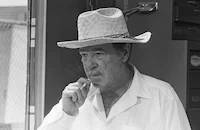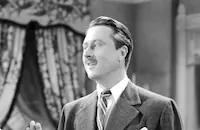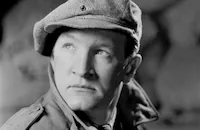If You Knew Susie

Brief Synopsis
Cast & Crew
Gordon M. Douglas
Eddie Cantor
Joan Davis
Allyn Joslyn
Charles Dingle
Phil Brown
Film Details
Technical Specs

Synopsis
Longtime vaudevillians Sam and Susie Parker retire from performing so that their two children, Marjorie and "Junior," can enjoy a normal childhood in Brookford, Massachusetts, Sam's ancestral home. To make ends meet, the Parkers convert part of their colonial house into a restaurant featuring cheap chicken and steak dinners. They are quickly forced to close down, however, after Mr. Clinton, the snobbish head of Brookford's influential First Families of the Revolution organization, orders the townspeople to boycott the place because the Parker family line boasts no colonial heroes. During an auction of their belongings, the Parkers discover a letter hidden in a wall, signed by George Washington, Thomas Jefferson and Benjamin Franklin. The letter is addressed to Sam's great-great-great grandfather, Jonathan Parker, and acknowledges his bravery during the Revolutionary War. Although Clinton doubts the authenticity of the document, Susie determines to prove its claim and heads for Washington, D.C. with Sam. In the nation's capital, the nearly broke Sam and Susie meet with immediate frustration, but are befriended by reporter Mike Garrett, who offers to share his newspaper's penthouse apartment for one hundred dollars. Unknown to Sam and Susie, Mike owes money to a loanshark and his two thugs, Marty and Willie, and has no legal right to occupy the penthouse. Consequently, when Mike's boss, the stuffy Mr. Whitley, arrives unexpectedly in town and encounters the unconventional pair in his penthouse, he is outraged. To save his job, Mike offers to help the Parkers with their letter and takes them to the National Archives. There Sam and Susie are overjoyed to learn that the document is indeed authentic. They are further thrilled when a close examination of the letter reveals that the U.S. government owes them £50,000, with interest compounded since the Revolution. After Mike breaks the news that the total amount owed exceeds seven billion dollars, Sam and Susie become overnight celebrities. While they are enjoying their sudden popularity at a charitable fashion show, however, Mike learns that Congress has declared their inheritance null and void. Before the news spreads, gangsters Steve Garland and Zero Zantini overhear a desperate Mike concocting a phony kidnapping scheme with Marty and Willie and decide to kidnap the Parkers themselves. When Steve and Zero show up at the penthouse, Susie and Sam, who have not been told they have lost their windfall, gladly go off with them, believing they have been sent by Mike. While Zero guards Sam and Susie at a warehouse hideout, Steve leaves to negotiate their release. Upon learning of Congress' decision, Steve then telephones Zero with orders to "get rid of" the Parkers. Before the zealous Zero can do the deed, however, Steve, who has just sold the story of the fake kidnapping to Mike's newspaper rival, orders him to stop. Although Sam and Susie escape from the gangsters unharmed, they are denounced in the news as greedy fakers. Now despised by an entire nation, the vaudevillians return to Brookford and hide out in their house with their children. Clinton, meanwhile, has arranged for Congress to investigate the Parkers, but to everyone's surprise, the Senate decides that Susie and Sam should be paid their inheritance after all. Having suffered enough, however, Susie and Sam decline the offer and insist on remaining poor.

Director

Gordon M. Douglas
Cast

Eddie Cantor

Joan Davis

Allyn Joslyn

Charles Dingle
Phil Brown

Sheldon Leonard

Joe Sawyer

Douglas Fowley
Margaret Kerry
Dick Humphreys

Howard Freeman
Mabel Paige

Sig Ruman

Fritz Feld
Isabel Randolph

Bobby Driscoll
Lee Frederick
Robert Bray
Jay Norris
Perc Launders
Carl Saxe
Norma Drury
Harry Harvey
Frank Marlowe

Addison Richards

Pierre Watkin
Sammy Stein
Dick Gordon
Regan Callais
Claire Carleton
Wallace Scott

Alma Carroll
Sandra Spence
Dorothy Abbott
Pat Barton
Nita Mathews
Rosemary Knighton
Barbara Freking
Albin Robeling
Warren Jackson
George Chandler
William Gould

Charles Halton

J. Farrell Macdonald
Joe Devlin
Mary Field
Kay Christopher
W. J. O'brien
Jeffrey Sayre
Lee Moore
Shirley Lopez
Joe Hinds
Graham Covert
Jimmy Kelly
Betty Lou Dieringer
Charmienne Harker
Lorraine Gale
Jean Lind
Helen Perissi
Marjorie Walker
Barbara Thorson
Edward Clark
Harry Denny
James Carlisle
Ralph Peters
Robert Clarke
Sedal Bennett
John Piffle
Marie Harmon
Donald Kerr
Eddy Hart

Paul Harvey
Patsy Creighton
Earle Hodgins
Syd Saylor
Charles Sullivan
Chalky Williams
Lois Austin
Bob Evans
Tex Swan

Ellen Corby
Crew
Harold Adamson
James E. Altwies
C. Bakaleinikoff
Gordon Bau
Ralph Berger
Jack R. Berne
Oscar Brodney
Henry Burton
Salvatore Cammarano
Eddie Cantor
Russell A. Cully
Albert S. D'agostino
James Daly
B. G. De Sylva
Gaetano Donizetti
Edgar "cookie" Fairchild
Fred Fleck
Marguerite Fogel
Jack J. Gross
Maxwell Henry
Ramez Idriss
Bob Keith
Annabelle Levy
Philip Martin
Jimmy Mchugh
Joseph Meyer
Charles O'curran
Harold Palmer
Bud Pearson
Clem Portman
Frank Redman
Renie
Art Say
Darrell Silvera
Jean L. Speak
George Tibbles
Lester A. White
Warren Wilson
Warren Wilson

Film Details
Technical Specs

Articles
If You Knew Susie
Cantor produced If You Knew Susie himself, and its title is that of one of his most popular songs, dating back to 1925. The original working title of the film was "Rich Man, Poor Man," but once the script was done and original songs completed, Cantor panicked. He felt the production needed some tried and true material, so RKO spent $20,000 to license the unlimited use of the song. Shortly after it was worked into the story, the title was changed, and the female lead character's name switched to Susie to accommodate it.
The plot serves as a means to showcase Cantor's schtick and irrepressible personality. As Sam and Susie Parker, he and comic actress Joan Davis are ex-vaudevillians who are not socially accepted in the small New England town where they've retired. After finding a document signed by George Washington awarding $50,000 to one of Sam's ancestors during the Revolutionary War, they learn the government owes them billions in compounded interest, opening the door to a noble gesture that makes them national heroes and the darlings of the local blue bloods who snubbed them.
The star/producer poured a lot of his own money into If You Knew Susie, hoping for a success similar to his earlier hit Show Business (1944), some footage from which is cut into this movie. RKO, the producing studio, was also banking on it, having done well with the earlier picture. But it took a few years to come up with an acceptable follow up vehicle; everything from a musical Western to something called "It Happened in Mexico" was announced as the follow-up Cantor project before they settled on If You Knew Susie. The film proved to be a modest success but didn't come close to the box office receipts of Show Business. Although Cantor would later refer to the film as the worst of his film career, most of the critical reviews were positive with Movieland proclaiming, "If you like Eddie Cantor (and let's start out understanding each other; we adore him!), this picture is your dish." Regardless, Cantor decided it was time to quit the picture business although his career was far from over. He next shifted his phenomenal radio success to the fledgling television medium and had a popular show for a few years until heart trouble forced him into semi-retirement.
Cantor's co-star in If You Knew Susie (and in Show Business), Joan Davis, also found success on the small screen. A likeable comic foil in pictures from the mid-1930s and star of a string of B-comedies in the 40s, Davis achieved TV success as the scatterbrained wife of a respected judge (played by Jim Backus of "Mr. Magoo" and Gilligan's Island fame) in I Married Joan between 1952 and 1955. Davis and Cantor were rumored to have had an affair beginning with Show Business and lasting through production on this picture according to their co-star Sheldon Leonard. Davis, in fact, was divorced from her husband during shooting. But once If You Knew Susie wrapped, the relationship between the stars waned and they were never as close again.
Cantor and Davis's son in If You Knew Susie was played by Bobby Driscoll, a loveable child star who made his debut at the age of six in 1943 and worked solidly through the 1940s. A year after this picture, Driscoll received his greatest acclaim as the terrorized child who witnesses a murder in The Window (1949), winning a special juvenile performer Oscar® for his work. Driscoll's success, however, began to wane as he got older. He made a few films in the 1950s, most notably providing the voice of the animated Peter Pan (1953) for Walt Disney's studio, where he was the first actor under contract. He ended his career with the juvenile delinquent drama The Party Crashers (1958). He then drifted into hard drugs and ten years later, at the age of 31, was found dead in an abandoned Greenwich Village apartment. He was buried as "John Doe" in New York's infamous "Potter's Field," but his corpse was later identified by his fingerprints.
One last bit of trivia on If You Knew Susie. Keep an eye out for the small, uncredited role of Ogleby. The actor playing the part is distinguished stage artist Jason Robards, Sr., father of the now better-known stage and screen actor. Robards Sr. also had a long and varied screen career, starting in substantial supporting roles in 1921 then moving to smaller character parts, often in Westerns. He kept working until 1961, two years before his death at the age of 71.
Director: Gordon Douglas
Producer: Eddie Cantor, Jack J. Gross
Screenplay: Oscar Brodney, Warren Wilson, additional dialogue by Bud Pearson, Lester A. White
Cinematography: Frank Redman
Editing: Philip Martin
Art Direction: Ralph Berger, Albert S. D'Agostino
Original Music: Edgar Fairchild, Ramez Idriss, Jimmy McHugh, George Tibbles
Cast: Eddie Cantor (Sam), Joan Davis (Susie), Allyn Joslyn (Mike), Charles Dingle (Mr. Whitley), Sheldon Leonard (Steve Garland).
BW-91m.
by Rob Nixon

If You Knew Susie
Quotes
Trivia
Notes
The working title of this film was Rich Man, Poor Man. The film's opening musical number, "My, How the Time Goes By," features some brief animation. Eddie Cantor and Joan Davis perform the song in blackface. New York Times noted that the title song had been a signature Cantor number since 1925. According to Variety, RKO paid $20,000 for the rights to the song. Included in the musical numbers was a spoof on the Sextette from the opera Lucia di Lammermoor, which is "performed" by four actors mouthing the words to a phonograph recording. Although CBCS lists Richard Powers in the role of "Graham," George Chandler actually played the part. A Hollywood Reporter news item adds Peggy Lynn to the cast, but her appearance in the final film has not been confirmed. Hollywood Reporter also noted that eight professional models were used in the picture. According to a Hollywood Reporter news item, the start of the film's production coincided with the anniversary of Cantor's thirty-eighth year in show business. If You Knew Susie marked the performer's last starring role in pictures. In 1952, he made his final screen appearance in a cameo role in The Story of Will Rogers.














